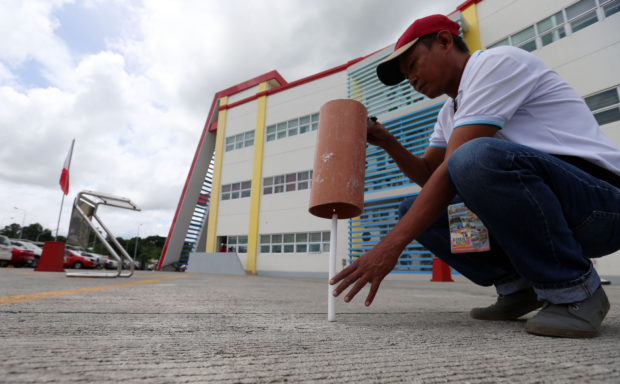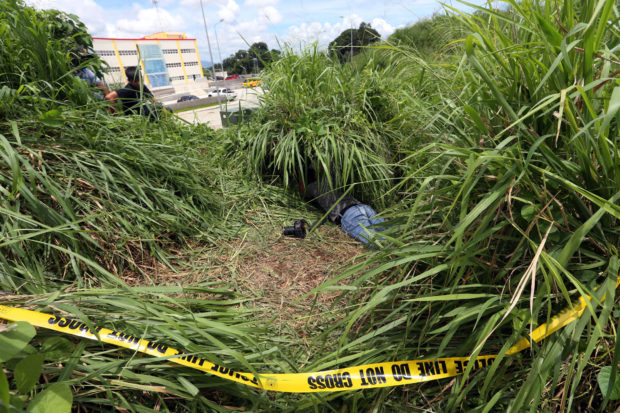Sniper kills mayor linked to drugs

CANDLE FOR MAYOR An employee of Tanauan City lights a candle on the spot where Mayor Antonio Halili was felled by a hidden gunman during Monday’s flag-raising ceremony at City Hall. —PHOTOS BY EDWIN BACASMAS
TANAUAN CITY — Antonio Halili came down hard on illegal drugs even as he also fended off allegations that he was a protector of drug syndicates and expressed fear for his life shortly after the Duterte administration launched its brutal crackdown on narcotics.
Until Monday, the tough-talking mayor of this city had been receiving death threats, but nothing specific.
Halili, who became controversial for parading drug suspects through the city streets and for landing on President Duterte’s “narcolist,” was shot dead on Monday at a flag-raising ceremony in front of horrified employees.
A bullet, possibly fired from a sniper’s rifle, pierced the chest of the 72-year-old mayor as he and around 400 municipal government employees sang the national anthem outside City Hall at 8 a.m.
“We are shocked, we are saddened,” Vice Mayor Jhoanna Villamor, who stood next to the mayor, told a radio station shortly after the shooting.
Halili was declared dead on arrival at C.P. Reyes Hospital.
Police were looking at the mayor’s shame campaign against drug suspects and criminals as one of the possible motives for the attack.
Halili was the fourth mayor killed in Mr. Duterte’s bloody war on drugs, which has left thousands of drug suspects dead and drawn condemnation from local and international human rights organizations.
The three other mayors killed were Samsudin Dimaukom of Datu Saudi Ampatuan, Maguindanao province, in October 2016; Rolando Espinosa of Albuera, Leyte province, in November 2016; and Reynaldo Parojinog Sr. of Ozamiz City, Misamis Occidental province, in July 2017.
Elected to a second term in 2016, Halili talked and acted tough on drugs and crime like Mr. Duterte, earning him the moniker “Little Digong” in the city south of Manila.
Parade of crime suspects
Halili gained notoriety when he paraded drug pushers and petty thieves, while they carried cardboard signs specifying their offenses. Human rights officials were alarmed.
“[My intention] is to warn the people. If you see these people [tagged as drug users], you would not want any of your family near them,” the mayor told the Inquirer in 2016 in defense of his shame campaign.
Halili’s name later appeared on Mr. Duterte’s so-called narcolist of officials allegedly linked to illegal drugs.
He was among 1,000 mayors who separately met with the President in Malacañang in January 2017 to clear their names.
In October 2017, Halili was stripped of supervisory powers over the local police as illegal drugs proliferated in his city amid allegations that he might have been involved. He denied the allegations.
Police crackdown
In August 2016, Halili said he supported Mr. Duterte’s campaign but believed drug kingpins should be the main targets. Otherwise, he pointed out, thousands would be killed.

VIEW TO A KILL A photographer checks a grassy area where a sniper may have shot Mayor Halili about 150 meters away.
In the interview with Reuters, Halili expressed apprehension over the way police carried out the crackdown and the reliability of their intelligence.
He voiced fears he might be accused of colluding with drug syndicates.
“If you are the mayor, and if somehow your views differ from the police, they will create a story, say you are into drugs and go after you and kill you. What can you do?” he said.
After Monday’s shooting, investigators scoured a nearby grassy knoll from where the gunman might have fired the shot.
“They did not see anybody approach him. They just heard a gunshot so the assumption or allegation was it could have been a sniper shot,” said Philippine National Police Director General Oscar Albayalde.
Extraordinary distance
Supt. Renato Mercado, Tanauan police chief, said the shot was fired from about 150 meters away.
“The distance from the position was extraordinary. It could not be done by an ordinary person. His skill can be compared to a trained sniper,” Mercado said.
Albayalde said investigators were looking into the connection between the killing and Halili’s “walk of shame” campaign.
“As a city mayor, he might have embarrassed and hurt people because that [campaign] was controversial,” he told reporters at Camp Crame.
Last week, Halili submitted additional documents to the National Police Commission to clear his name of the drug allegations, according to city information officer Gerard Laresma.
“[Halili] was telling us there were threats but nothing really specific. What he would always say was: if it’s my time, it’s my time,” Laresma said. —With reports from Jaymee T. Gamil, Inquirer Reseearch and the wires
